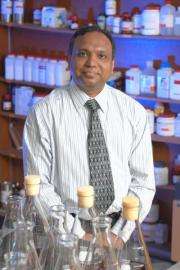Drug to treat alcoholism goal of UH professor's research

With the ultimate goal to discover a drug that one day treats alcoholism, a University of Houston (UH) pharmacy professor is working on pinpointing the mechanisms in the brain that respond to alcohol.
Joydip Das, a medicinal chemist and pharmacologist in the UH College of Pharmacy, received a three-year, $450,000 grant this year from the National Institutes of Health (NIH). In the end, his team hopes their research will help lead them to a way to prevent people from drinking in excess.
"Defining targets and elucidating the molecular mechanism of their actions is needed for effective intervention," Das said. "Once we understand the target, then we design drugs based on that target."
More specifically, Das explained that addictions are related to the brain, with protein kinase C (PKC) - particularly of the PKCε subtype - being mainly expressed in the brain and playing a key role in this process. Previous observations have indicated as much as a 75 percent reduction of alcohol drinking in mice using knockout technology, demonstrating that knocking out the PKCε protein cuts desire.
He says that it's difficult to pinpoint where alcohol acts and what its target is, so his team's objective is to find the target and then determine how it interacts with ion channels to affect the addiction.
"We're looking at the significance of the interaction between the alcohol molecule and PKCε protein. How the alcohol molecule binds with the target is the key," Das said. "This binding has implications in addiction, so our intent is to design drugs to curb the desire for more than a small amount of alcohol so that people stay away from excessive drinking."
Trained at MIT and having worked in the anesthesia department at Massachusetts General Hospital, Das has a particular interest in this area, saying that alcohol also is an anesthetic, with PKCε being one of its many targets.
"Our focus is brain chemistry. In our study, we have seen that PKCε and alcohol interacts and have pinpointed the binding side," he said. "Now, we must determine the molecular mechanism of the interaction. To do so, we are looking at how those two interact in the neuronal cells, which are the impulse-conducting cells in the brain."
The group's next steps will be to progress to animal trials with the mouse model and then ultimately to clinical trials with humans. Working with Das on this project are postdoctoral fellow Satyabrata Pany and undergraduate student Khoi Ly.
















